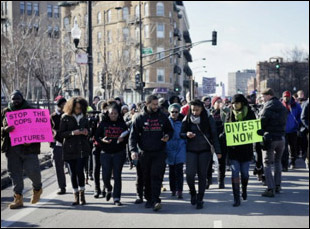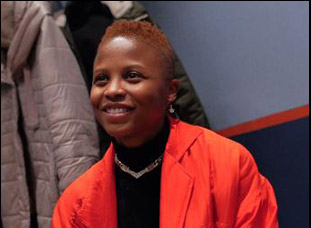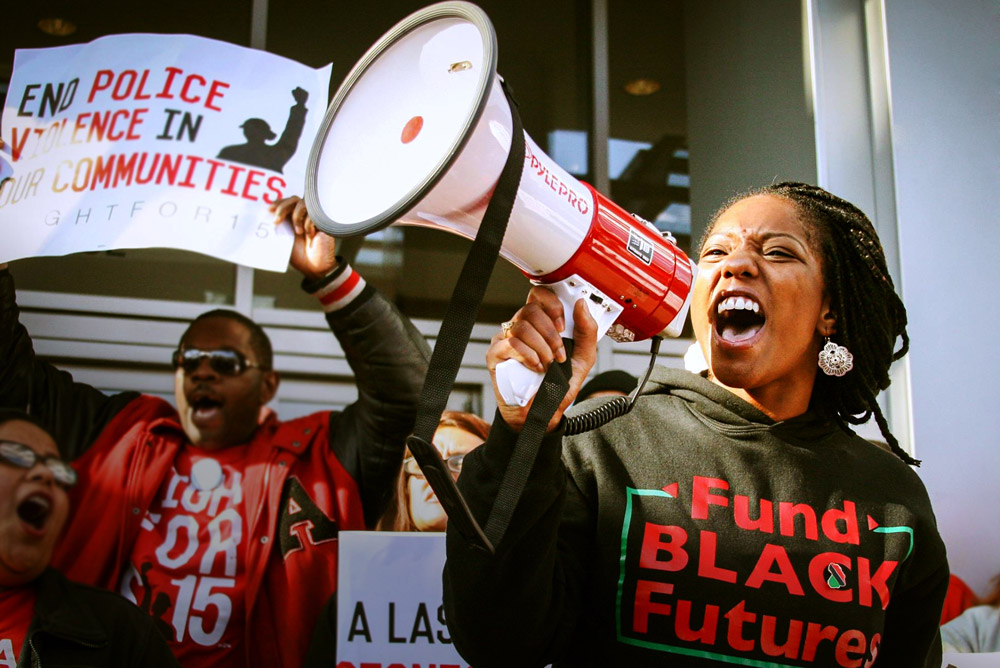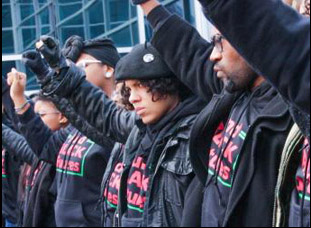In August of 2015, Ashley O’Shay brought her camera along to a Chicago Police Board hearing that had been packed with activists from the community awaiting word on the investigation into the killing of Rekia Boyd, a 22-year-old African-American woman who had been at a park with friends, at the hands of an off-duty officer. When the board wasn’t providing any new information, the activists decided to make some noise of their own.
“They shut the board hearing down, and the energy in the room was electric,” recalls O’Shay. “I [thought], I need to pursue this further.”
It is a similar scene that opens “Unapologetic,” O’Shay’s electrifying debut feature, as a swarm of activists interrupts brunch service at a local diner to bring attention to then-Mayor Rahm Emanuel’s commitment of over 40% of the city’s budget to the police. Even if the man calling in the cops to quell the protest wasn’t dressed as an elf — to be fair, this was around Christmas — the scene would be surreal when such action has become necessary to correct such an injustice, but as much as your eye is drawn to the young Black women who lead the chant, the patrons, who would be far too comfortable to go back to their pancakes if not for the intensity of this disruption, are equally noteworthy.
In following Janaé Bonsu and Bella BAHHS, two young leaders in this ongoing movement for accountability and equality, “Unapologetic” brings the full energy and efficacy of their activism to the screen and shows how it takes different forms in this day and age. Bella, a self-described raptivist, can be seen on the front lines of rallies in support of cases moving forward for the cops that killed Boyd and Laquan McDonald, unafraid to drop truth on the police standing guard with guns made to look less powerful by her words, while Bonsu is working her way towards a doctorate in social work, aiming to create change from within the ivory tower of academia. Watching both assert their right to be in spaces that haven’t always been welcoming to them as Black women is quite exciting, but equally so is how it allows O’Shay to carve out a place for their voices, including her own, in the broader media firmament, using the expansive canvas of the big screen to question why in social movements meant to elevate the historically marginalized, certain voices are still more privileged than others as it celebrates what these women bring to the table.
There couldn’t be a stronger opening night selection for Philadelphia’s Blackstar Film Festival, which has had to migrate largely online this year as a result of the COVID-19 pandemic, and with “Unapologetic” bound to break through with its already resounding subjects amplified far and wide with access to the film available to all, O’Shay spoke about how she was thrust into her feature debut, working with Chicago’s legendary doc house Kartemquin, and taking inspiration from her strong-willed leads to tell such an impactful story.
It actually started in the fall of 2015. I was just leaving undergrad and had decided to move back to Chicago after a little bit of time away, and right around that time, the case for Rekia Boyd was getting more visibility within local media. I was really just curious initially about the voices that were being prioritized in that moment. They were not the typical civil rights leaders of the ‘60s and ‘70s. They weren’t religious leaders, they weren’t men. They were young black women that looked just like me and that I was able to immediately relate to. That just happened to coincide with my internship at Kartemquin Film, and at the time, I was making a short piece for that internship and I reached out to Janaé, just to see what the Black Youth Project was about and what she was up to. She was the Chicago co-lead at the time for their chapter and I just started filming with her at different actions and events.
Initially, I just saw it as a short piece, profiling this one voice within the movement, but about halfway through filming with her, the infamous Laquan McDonald tape was released and Chicago just exploded. In that moment, I felt there was a bigger story to be told and that’s when I started to connect with other black feminist voices in the space. Bella became another protagonist, and as you see in the film, a few other voices as well, so it came about as part of my curiosity.
You resist the more traditional framework that a film like this could have by following the Rekia Boyd or Laquan McDonald cases as a central storyline – they’re in there, but you really tell the story from the women’s proactive voice rather than spend much time looking back, which is an exciting way to frame this. Was that in mind from the start?
I really just took their lead in thinking about how to frame the conversation within the film. Janaé was part of Black Youth Project 100, and their framework is this idea of a black, queer, feminist lens and organizing everything from the perspective so the voices that are even further marginalized within the black community — queer voices, trans voices, non binary voices — once [they] get free, everyone else gets free, and that’s a similar sentiment for a lot of other collectives and organizations in Chicago. With Bella, she is centering from her experience from having two parents who were in prison for the beginning part of her life, living in a neighborhood that’s been historically disenfranchised and experiences a lot of violence in terms of how resources are allocated from the city of Chicago, so everything she does is from this perspective of abolition and not having your leaders or your family members [around], how that can be detrimental to the community at large. For the both of them, it was about centering things from their own experiences as black women, but it’s clear that they have different experiences within that and I hope that’s part of what the film gets across is one black story is not a monolith for every black story that should be told.

I had a bout of good luck. Thinking back on it, I asked Jenae about other characters that could be good for the film and when I mentioned Bella, she was automatically encouraging me — the first time I met Bella, she was at an event with Janaé and Janaé made me go talk to her. [laughs] So it was all about balance. There were a lot of other voices within the movement that I had followed for more than just one event, but ultimately, Bella and Janaé brought the best balance and are not on opposite ends, but people often describe them as fire and ice. Janaé’s in academia, striving for the structural change while still working in the grassroots movement while Bella is a Chicago West Side native who’s artistry is a big entry point for her into the movement and ultimately has larger goals for how she sees that manifesting, so once we started to go with that and cut things together and see how well they played off of each other, we really started to lean into that.
You also give the room for them and others, such as Janaé’s mother when she’s discussing how she wants to be identified as queer rather than gay, to discuss things in such a way where it doesn’t seem relative to another experience — like as women, they aren’t being compared to men. They are able to talk about their own unique path. Was that something you were conscious of?
Yes, absolutely. Often times, women are seen in the framework of men and the same could be said of blackness, [as it’s] seen in the framework of whiteness. For this film, I found that a lot of the media that I had seen around this specific movement for black lives may consider outside perspectives like the male voices within that space, but it seems like there’s this push for balance between all the voices, and the experience of making “Unapologetic” showed there’s a lot to be said when you just center a black woman’s perspective. We experience life at the intersection of both our race and our gender, so that’s a very specific experience and that’s something I didn’t want to lose by trying to frame it in a more objective or balanced sense with male voices, [for instance].
Was there anything that happened over the course of shooting that changed your ideas of what this could be?
So much happened. [laughs] The hardest part was what we had to leave out of the film, just for the sake of wanting to tell a succinct and effective story. From probably the moment of the Laquan McDonald tape [came out] until that next year when Donte Servin [the officer who killed Rekia Boyd] resigned, a bunch of stuff happened. In particular, we had filmed a good amount of the state’s attorney’s race with Anita Alvarez, who’s featured in the film briefly, and there was a collective of young black organizers in the city that were able to oust her in a pretty quick turnaround campaign. She had been there for multiple terms, so that was something that we followed pretty closely, and Bella was part of a collective that occupied a lot across from a police torture site for forty-something days called Freedom Square that we thought was going to be a huge part of the piece, but it became clear as we started pulling this film together that what people were most interested in was the experience of our two main protagonists. That doesn’t mean they didn’t want to experience the larger Chicago political context that was happening, but it just became a decision of wanting to honor the story and honor these two voices while still trying to keep up with the chaos of Chicago politics.

Yeah, especially when we decided to center around the police killings of Rekia Boyd and Laquan McDonald. It was really important to me that we honor these two young black people in the same way that we’re providing a deeper look into the lives of Janaé and Bella. The murder of your citizens, that’s a pretty serious offense, so I just wanted to honor their lives and a lot of the work that Janaé and Bella and organizations in the city were doing, even though it may not directly be about Rekia and Laquan, is usually something that comes from the worst of the worst of what the city can do. Even the work [of] staying across from that police site [Freedom Square] for 40-something days, that’s something that somebody like a Laquan McDonald could’ve experienced when he was living on the West Side of Chicago, and it doesn’t exist outside of a lot of the issues that are happening. So this is really supposed to be a touchpoint and a conversation starter into those ongoing political issues we’re seeing in the city.
It’s your first feature, what’s it like getting to the finish line?
It is a great relief. There’s no way I could’ve anticipated the film coming out during the largest pandemic of our lifetime and for a while, I think we saw that as a detriment because when the pandemic escalated here in the U.S., we were in the finishing process and submitting to festivals. We were really worried that the film would lose some of its impact because of not being able to have that in-person theatrical festival experience, but having the opportunity to premiere it at Blackstar and being able to do that digitally, so anyone anywhere can see it as long as they have the means, it feels like a perfect, twisted situation in this moment where there’s more civil unrest happening around black lives. I hope that with what is happening currently in major cities throughout the country, people are able to use it as a tool to strengthen their work and to stay encouraged.
“Unapologetic” will premiere at the Blackstar Film Festival on August 20th at 7:30 pm EST. Tickets are available here. It will next screen virtually as part of the American Black Film Festival from August 21st-30th, and have an outdoor premiere in Chicago on August 21st at the Museum of Science & Industry, which you can register for here. It will next screen virtually at DOC NYC, available to stream from November 11th through 19th.





